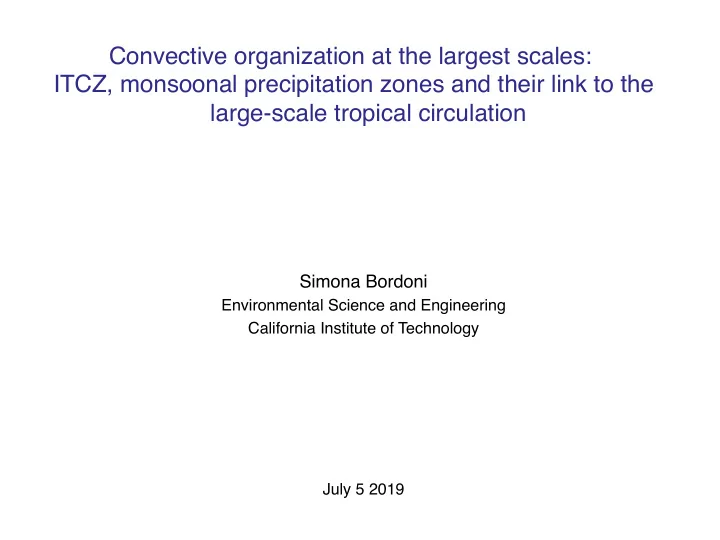

Convective organization at the largest scales: ITCZ, monsoonal precipitation zones and their link to the large-scale tropical circulation Simona Bordoni Environmental Science and Engineering California Institute of Technology July 5 2019
Clouds seen from above http://badc.nerc.ac.uk/data/claus/
Observed distribution of precipitation Data source : GPCP
Observed distribution of precipitation Data source : GPCP
Observed distribution of precipitation Why is the maximum precipitation (ITCZ) north of the equator? Data source : GPCP
Precipitation is tied to the atmospheric circulation m s -1 Data source : ERA40
Precipitation is tied to the atmospheric circulation Hadley cell Ferrel cells Easterlies Westerlies Westerlies Data source : ERA40
Precipitation is tied to the atmospheric circulation Hadley cell Ferrel cells Easterlies Westerlies Westerlies Maximum precipitation is co-located with ascending motion in the Hadley cells
Large-scale circulations and clouds Hadley/Walker Circulation Cloud Clusters Land/Sea Circulation stratocumulus tradewinds trade winds warm, western tropical oceans cold, eastern subtropical ocean EQ Courtesy: Bjorn Stevens
What drives the Hadley circulation
Implied poleward energy transport
Atmospheric and oceanic energy transport The general circulation of the atmosphere exists to transport energy from regions with net energy gain to regions of net energy loss
The energy budget for a moist atmosphere
The energy budget for a moist atmosphere h = C p T + L v q + gz Relates the circulation to energy sources and sinks, without explicit consideration of latent heating e.g., Neelin and Held (1987), Held (2001), Merlis, Eisenman, Bordoni and Schneider (2013 a,b,c)
Energetic constraint on Hadley cell ITCZ ϕ δ ϕ δ Eq Adapted from Schneider et al. 2014 Because MSE is positively stratified, the Hadley cell usually transports energy in the direction of the upper-level flow
Energetic constraint on Hadley cell ITCZ ϕ h vh i 0 δ ϕ δ Eq Adapted from Schneider et al. 2014 ITCZ position is anti-correlated with the cross-equatorial energy h vh i 0 transport e.g., Kang et al. 2008, Hwang and Frierson 2012, Donohoe et al. 2013, Bischoff and Schneider 2014
What drives hemispheric asymmetry? Marshall et al. (2013)
Role of ocean heat transport Marshall et al. (2013), Frierson et al. (2013)
Mechanisms of northward shifted position of the ITCZ Frierson et al. (2013)
Energetic constraint on Hadley cell ITCZ ϕ h vh i 0 δ ϕ δ Eq Adapted from Schneider et al. 2014 ITCZ position is anti-correlated with the cross-equatorial energy h vh i 0 transport e.g., Kang et al. 2008, Hwang and Frierson 2012, Donohoe et al. 2013, Bischoff and Schneider 2014
ITCZ and EFE Net energy deficit Net energy input ITCZ ϕ h vh i 0 Height δ ϕ δ S Eq N h vh i Energy Flux Equator e.g., Kang et al. 2008, Hwang and Frierson 2012, Donohoe et al. 2013, Bischoff and Schneider 2014
ITCZ and cross-equatorial energy transport Donohoe et al. 2013
Tropical rainbelts in climate models ( ) ( ) IPCC Assessment Report 5 (2013)
Recommend
More recommend